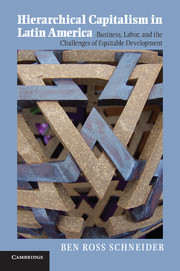 Hierarchical Capitalism in Latin America
Hierarchical Capitalism in Latin America Book contents
- Frontmatter
- Contents
- List of Figures
- List of Tables
- Abbreviations
- Preface
- Part I Theory and Frames
- Part II Business, Labor, and Institutional Complementarities
- Part III Politics, Policy, and Development Strategy
- 7 Business-Group Politics: Institutional Bias and Business Preferences
- 8 Twenty-First-Century Variations
- 9 Conclusions
- Appendix Interviews
- References
- Index
9 - Conclusions
Published online by Cambridge University Press: 05 August 2013
- Frontmatter
- Contents
- List of Figures
- List of Tables
- Abbreviations
- Preface
- Part I Theory and Frames
- Part II Business, Labor, and Institutional Complementarities
- Part III Politics, Policy, and Development Strategy
- 7 Business-Group Politics: Institutional Bias and Business Preferences
- 8 Twenty-First-Century Variations
- 9 Conclusions
- Appendix Interviews
- References
- Index
Summary
Introduction
In 2006, Andrés Benitez, the rector of the Universidad Adolfo Ibáñez, wrote an op-ed column, titled “Why the Papelera is not Nokia,” in the Chilean news magazine Capital (Benítez 2006). The column noted that Nokia, like la Papelera (the nickname for the Compañia Manufacturera de Papeles y Cartones, CMPC, of the Matte Group), had started in forestry, pulp, and paper, but that Nokia had invested heavily in R&D and shifted out of forestry. Nokia's investment in telecommunications, over many years and drawn from profits in other Nokia subsidiaries, allowed Nokia in the 1990s to lead the first boom in cellular phones (see also Sabel 2009). La Papelera, in contrast, had no strategy, according to Benitez, for using innovation and R&D to work its way out of forestry. Several weeks later, Capital published a response article by Bernardo Matte, one of the scions of the Matte family, that defended CMPC's investment in forestry (Matte 2006). Matte wrote that Nokia was no longer competitive in forestry and did the right thing in moving into other sectors. But, CMPC was still the lowest cost producer in the world and was investing in R&D in forestry to keep it that way, so the Matte group saw no reason to invest in other sectors.
This exchange was revealing on multiple levels. Business groups have a diversified structure that makes them, in principle, ideally suited to lead diversification out of commodities and low value added activities, as Nokia and many Asian business groups have done. As noted in Chapter 3, some groups are more predisposed to new ventures and higher-technology activities (or states pushed them in that direction). The Matte group fits best in the category of the less specialized, less innovative portfolio-type of business group. The exchange over La Papelera also illustrates at least implicitly the effect of the commodity boom on more conservative business groups. When commodity prices are sky high, the irresistible incentive for business groups is to invest more in these commodities, thereby reinforcing their structure, strategy, and relative absence of R&D. The Votorantim group in Brazil also expanded investments in forestry at the same time it closed down its subsidiary in venture capital (see Chapter 8).
- Type
- Chapter
- Information
- Hierarchical Capitalism in Latin AmericaBusiness, Labor, and the Challenges of Equitable Development, pp. 185 - 198Publisher: Cambridge University PressPrint publication year: 2013
